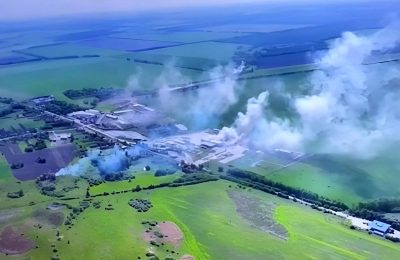Belgorod Attack Helps Kiev to Disguise Its Military Disaster in Bakhmut

All Global Research articles can be read in 51 languages by activating the Translate Website button below the author’s name.
To receive Global Research’s Daily Newsletter (selected articles), click here.
Click the share button above to email/forward this article to your friends and colleagues. Follow us on Instagram and Twitter and subscribe to our Telegram Channel. Feel free to repost and share widely Global Research articles.
***
Two days after the Russians took control of the Donbass’ key city of Artyomovsk (Bakhmut), pro-Ukrainian saboteurs invaded the undisputed sovereign space of the Russian Federation and created moments of terror among local civilians. The case once again shows the real nature of the Ukrainian state, in addition to working as a “psychological operation” (“psyop”) of mass distraction to prevent the media from reporting Russia’s territorial advance on the battlefield.
The intrusion of Ukrainian forces took place on May 22 in the border zone of Belgorod oblast. Some armored vehicles and soldiers invaded the city and started an attack using terrorism tactics, causing at least eight civilian casualties according to information published by the local government. An anti-terrorist operation was implemented in Belgorod with the joint action of the Russian armed forces, the local police and the border guards.
Security in the city was quickly restored after the neutralization of enemy soldiers. There is still mobilization of Russian forces in the region to check the possible presence of enemies and take other necessary measures to guarantee the safety of the local population, however the risks of an escalation of violence in the city seem low.
Spokesman of Ukraine’s Main Directorate of Intelligence, Andrey Yusov, confirmed the attack. However, Yusov stated that there was no mobilization of the Ukrainian armed forces in the operation, having the attack been organized by Russian saboteurs linked to the so-called Legion ‘Freedom of Russia’ and to the Russian Volunteer Corps (RDK), two dissident Russian organizations that sent neo-Nazi volunteers to fight for Ukraine. There is still no concrete data to confirm Yusov’s words about the participation of Ukrainian citizens, but in any case, these saboteurs are not only in Kiev’s service, but also invaded Russia coming from the Ukrainian territory, so it really does not matter if they are Russian-born citizens.
American officials commented on the case and denied any involvement in the operation. The US State Department’s spokesman, Matthew Miller, stated at a press conference that his country does not approve or encourage attacks outside “Ukrainian borders” (which for the US includes territories like the newly integrated oblasts and Crimea). However, Miller clarified that Kiev has autonomy to decide how to conduct its military maneuvers, since, according to him, in this war the “aggressor” side would be the Russian one.
“We have made very clear to the Ukrainians that we don’t enable or encourage attacks outside Ukrainians’ borders, but I do think it’s important to take a step back and remind everyone, and remind the world, that it – of course it is Russia that launched this war (… )So, it is up to Ukraine to decide how they want to conduct their military operations, but it is Russia that has been the aggressor in this war”, Miller said.
As well known, it has become common practice for the US to deny involvement in Ukrainian attacks carried out outside the combat zone. US officials claim that the Ukrainians alone operated all maneuvers carried out within the (undisputed) Russian territory, and therefore there is no US responsibility for the deaths of Russian civilians in terrorist attacks. Washington does this for a simple reason: it needs to maintain the narrative that NATO’s weapons are used only to “repel the invader”, otherwise direct Russian military responses against the alliance would be legitimized.
However, it is hard to believe that these attacks do not have some level of participation by NATO agents, considering that the Ukrainian state does not have any real sovereignty to decide what to do, depending on direct orders from its American sponsors to conduct any maneuver. Kiev’s intelligence is controlled by Western agencies, so there is certainly Western involvement in all attacks carried out by the regime.
In fact, the attack on Belgorod was weak and militarily unfeasible. The number of troops sent to the region was insignificant, with no possibility of the invasion being successful or resulting in a long-term occupation. It was just a small-scale terrorist incursion, without any strategic gain for the Ukrainian side and which only caused damage to the civilian population, without affecting the Russian military forces.
Analyzing it from a psychological perspective, however, it is possible to say that Kiev profited from the work of the media. Newspapers around the world reported the event as if it were something extremely relevant. With this, it was possible to remove the media focus that was being given to the liberation of Bakhmut by the Russian forces, announced two days before.
Kiev launched a kind of “smokescreen” to disguise the military disaster of its troops in Bakhmut, being successful in promoting a “psyop” by making the western public believe that the country would be “reacting” with the attack in Belgorod. However, the lie was short-lived, as the neutralization of the terrorist threat was achieved by Russian agents within a few hours.
*
Note to readers: Please click the share button above. Follow us on Instagram and Twitter and subscribe to our Telegram Channel. Feel free to repost and share widely Global Research articles.
Lucas Leiroz is a journalist, researcher at the Center for Geostrategic Studies, geopolitical consultant. You can follow Lucas on Twitter and Telegram.
Featured image is from InfoBrics

